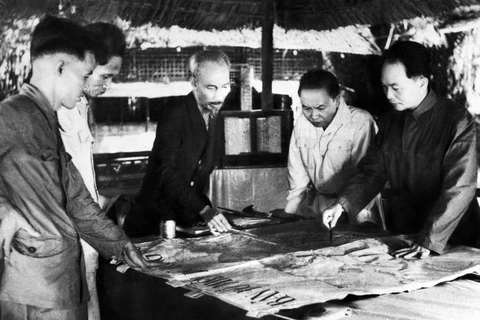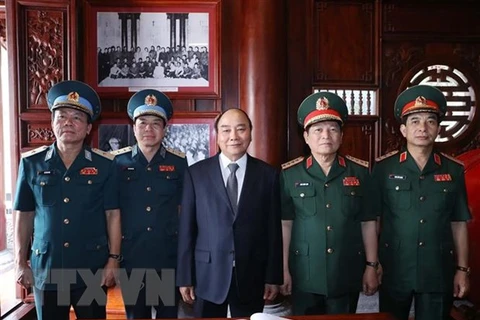Hanoi (VNS/VNA) - In 1953, eight years after reinvading Indochina, despite having mobilised huge economic and military resources, the French colonialists failed to achieve their purpose of destroying the revolutionary government and resistance forces to reestablish their rule throughout Indochina. On the contrary, they suffered heavy losses: 390,000 troops.
Financial difficulties and protests in France were increasing, putting the French government in a new political crisis. Taking advantage of this situation, the US imperialists stepped up their intervention in Indochina, helping France to extend and expand the war in order to serve their global anti-revolutionary strategy.
In May 1953, the French government appointed General Navarre commander of the expeditionary army in Indochina in the hope of winning a decisive military victory and an end to the war. In July 1953, General Navarre proposed a new plan in Indochina (also called the Navarre Plan).
Both the French colonialists and the American imperialists said the Navarre Plan was "perfect" and would bring victory within 18 months.
The Navarre Plan was a large-scale strategy aimed at wiping out the greater part of forces within eighteen months and occupying Vietnam permanently to provide a colony and military base for the American and French imperialists.
The High Command of the French Expeditionary Corps concentrated its efforts on the Hong (Red) River Delta with 44 mobile battalions, and launched a fierce mopping-up operation in its rear. At the same time, they armed local locals to sow confusion in the northwest. In early 1954, Navarre dropped paratroopers into Dien Bien Phu.
On the Vietnamese side, at the end of September 1953, the Politburo of the Party Central Committee met to discuss a strategic policy for military activities in the winter-spring period of 1953 – 1954. The plan was to attack areas where the enemy was weak, while at the same time promoting guerrilla warfare.
The Vietnamese army and people cooperated closely with the militia and Laos and Cambodia to launch attacks on the Indochina battlefield, forcing France to disperse its forces. The enemy's main force was split into five smaller forces that struggled to support each other.
In coordination with the main troops, the Vietnamese forces protected resistance bases, cut off traffic, and attacked and destroyed more of the enemy’s bases. Navarre was bankrupt.
On the northwest front, from November 1953, the French command in Indochina decided to send troops to build Dien Bien Phu into a strong military base. In General Navarre's mind, Dien Bien Phu held an important strategic position.
By early March 1954, enemy troops numbering more than 16,000 had gathered in Dien Bien Phu, including the most elite military units in Indochina. They had 49 bases divided into three zones. Both France and the United States regarded Dien Bien Phu as an "unbreakable fort".
On the Vietnamese side, the Party Central Committee and the Supreme Command were determined to launch a campaign to attack Dien Bien Phu - a decisive strategy to successfully end the resistance war against the French colonialists. General Vo Nguyen Giap was assigned to command the campaign.
Over 55,000 soldiers were sent into battle, and 260,000 labourers and 27,400 tons of rice were put on standby. Tens of thousands of young people volunteered to work with the army to open a road to the battlefield despite enemy shelling.
In just a short time, thousands of kilometres of roads were built or repaired.
On March 13, Vietnamese troops launched their offensive on Dien Bien Phu, which lasted for 55 days until the complete destruction of the entrenched camp on May 7, 1954. It was an historic victory.
The 1954 Dien Bien Phu Victory crushed the French colonialists and the United States, forcing the French government to sign the Geneva Agreement in July 1954, recognising independence, sovereignty, unity and territorial integrity of the three Indochinese countries, ending Vietnam’s long-lasting resistance war. At the same time, it ended the domination of French colonialism that lasted for centuries, and opened a new development step for the revolution of Vietnam, Laos and Cambodia.
The 1954 Dien Bien Phu Victory smashed colonialism and opened a new era for the human race - the era of ending the rule of colonialism around the world.
French historian Jules Roy later said that “The Dien Bien Phu defeat was one of the greatest failures of the West, heralding the collapse of colonial empires.”
This victory also had a pervasive effect, encouraging other oppressed countries to fight against imperial regimes. At the same time, it contributed to lightening the truth of Marxism-Leninism today: A weak and small nation and a people's army, once resolved to stand up, to unite together and to fight for independence and peace, will have the full power to defeat all aggressive forces."
The victory at Dien Bien Phu was the result of many factors: creative political guidelines and military policies; patriotism and Vietnamese military strength; solidarity among the three peoples on the Indochinese peninsula; the important help of China and the Soviet Union as well as the support from international friends, including the French people. But the most important factor was a love for the homeland, the burning desire for independence, and freedom for all Vietnamese people./.
VNA























